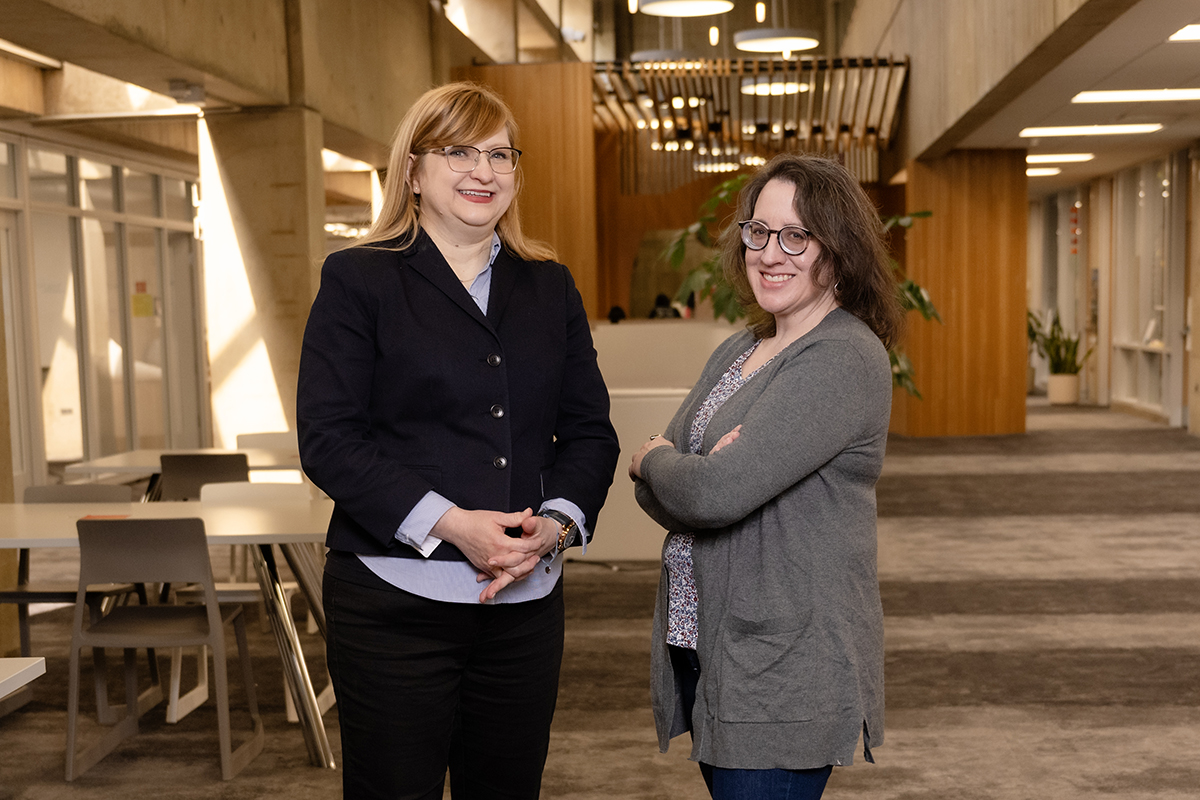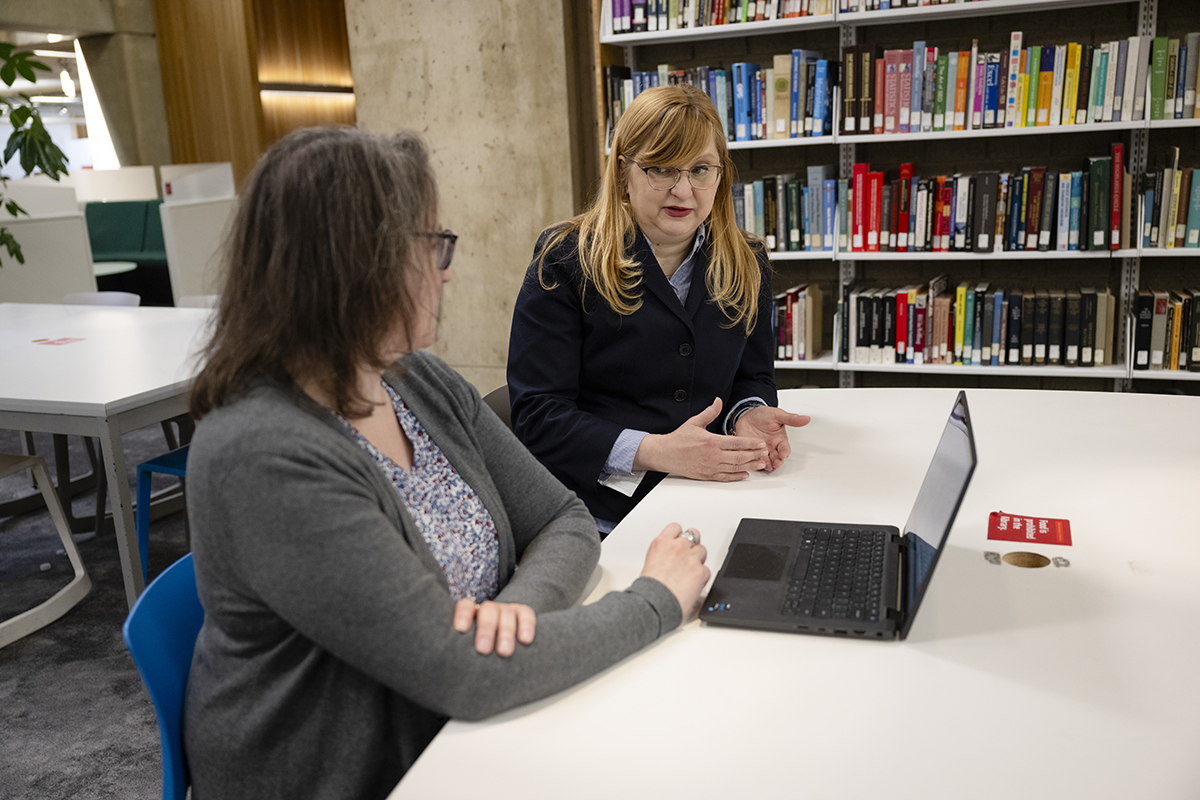Libraries Staff Supports Essential Infrastructure

by Sarah Bender, Communications Coordinator
The University Libraries has been a longtime proponent of initiatives that support collaborative, transparent, openly accessible, and reproducible research across all disciplines at Carnegie Mellon University. For all of the work that is publicly recognized across campus — from central resources like the Open Source Programs Office to events like the annual Open Science Symposium — there’s an equal effort that happens behind the scenes. At the University Libraries, a few key staff members work to maintain the infrastructure that supports open science at various stages of the research cycle.
KiltHub is CMU’s institutional repository, maintained by the Libraries and hosted on the Figshare platform. Launched in July 2018, KiltHub enables researchers to share the scholarly outputs and research data produced in the course of their scholarship, to meet funder mandates and publisher requirements for open research. In its first five years of service, it has supported more than 20,000 items uploaded — and millions of views and downloads from the community.
Institutional Repository Specialist Katie Behrman serves as a liaison between Figshare and the Libraries’ team. She keeps up to date with new functionalities and features of the software that researchers can take advantage of. She also provides a layer of curation between researchers submitting their work and that work going public on the web, checking over metadata to ensure a project is ready to publish.
Faculty and graduate students automatically receive a KiltHub account, and as new data sharing policies are announced, usage continues to increase. More than half of the submissions to date take the form of theses and dissertations, but there are also a significant number of datasets, articles and reports, preprints, and more.
“Carnegie Mellon and the Libraries have been at the forefront of helping our community showcase their work in a way that is most accessible to them,” Behrman said. “We’re always looking for ways to open up possibilities and connect researchers with more resources that can increase the reach and impact of their groundbreaking research.”
Diving deeper into data on the platform, Data Deposit Coordinator Ann Marie Mesco provides a final check before a dataset is published. Ultimately, it’s her role to confirm that the data can be shared successfully. She makes sure that researchers have included their contact information, that their files are named correctly, and that the deposit can be downloaded by other users.
“We get so many interesting datasets, and I see helping make those available as a part of the Libraries’ core responsibility to ensure access and discovery,” she said. “If people can’t find out about the research going on out there, they can’t use it. It’s only after we make that information available to the public that we can see where it leads.”

To make KiltHub more accessible, Behrman, Mesco, and departmental librarians offer personalized support to researchers looking for help with data curation, copyright and licensing, funder mandates, and more. Behrman and Open Knowledge Librarian Emily Bongiovanni also offer workshops each semester designed to walk students through the steps for submitting their thesis or dissertation to the platform.
The Libraries now offers another tool that makes it possible to collect and work with data earlier in the research cycle. Redivis is a dynamic data collaboration platform designed to share datasets with collaborators and analyze and visualize data in real-time. Users can browse available datasets, apply for access, perform analyses, and export data derivatives and final figures.
“Even with KiltHub, we were lacking a platform where people could come together to work with data, and Redivis provides that,” said Open Science Postdoctoral Associate Kristen Scotti. “You can collaborate with people directly on the platform, and work with big data sets without having to download them on your computer. Everything you’re doing to your data is getting recorded in real time.”
Working directly with clients on campus to tailor the platform for their unique data needs, Scotti aims to expand use of Redivis across campus by ensuring different departments understand how it can fill gaps in their research process. She also taught several workshops this past semester geared toward helping new users become comfortable using the tool.
“Students at CMU are very enthusiastic about open science and the overall value of the movement,” she said. “I help them discover how they can best contribute — how they can modify their workflows and practices to make sure they’re participating.”
Together, KiltHub and Redivis make open science more accessible to researchers on campus, and Behrman, Mesco, and Scotti want even more users to be able to benefit from the tools.
“It’s important to remember that open science isn’t just about ‘science,’” Behrman said. “We want to make research and scholarly output available whether it’s from science, business, humanities, or art. We can collaborate with researchers from a range of fields to share their work in a way that’s appropriate for their discipline.”
“There’s something in the realm of open science that’s accessible to everybody, and we encourage each individual to participate in the way that works for their needs,” Scotti added. “What that means for different people is going to vary, but we really want to promote the inclusiveness of this movement.”
